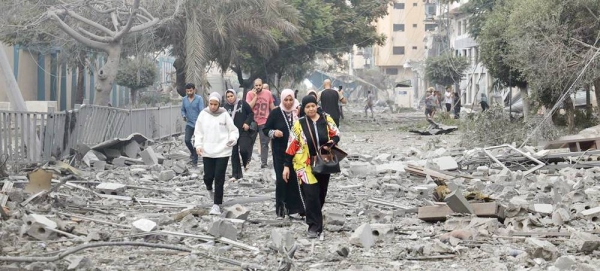
While the pandemic has been a major stumbling block for humanity and will take years to fully overcome, environmental issues are slowly coming back to the fore, with climate change representing an important and urgent problem. There are a number of factors that are bringing about this realization, including stronger awareness and action by the young generation, as well as various commitments now being made by political and religious leaders around the world.
Let us focus on Islamic scholars and leaders and Muslim people more broadly.
In August 2015, 40 or so Islamic scholars, policymakers and Muslim social activists gathered in Istanbul to discuss climate change and other environmental and planet-related issues. They issued a bold, well-informed and wide-ranging declaration that set clear targets on greenhouse gas emissions (to be phased out by 2050) and energy sources (complete switch to renewable sources by 2050).
The declaration reminded Muslims of their religious responsibilities and duties to safeguard the planet that we have been entrusted with: “What will future generations say of us, who leave them a degraded planet as our legacy? How will we face our Lord and Creator?” It also pointed to a host of environmental, ecological and socioeconomic issues that require our immediate and serious attention, including: Global and local climate change; the contamination and befoulment of the atmosphere, lands, water systems and seas; soil erosion, deforestation and desertification; and damage to human health, including a host of modern-day diseases. It also presented a list of Islamic moral and behavioral principles to live by for the betterment of our planet and human communities.
Commenting on the declaration, Hakima El-Haite, then Morocco’s minister for the environment, underscored the religious basis for the call and the program that the leaders issued by saying: “It is an emotive call for a spiritual fight against climate change that will be very important for Muslims… I think that the right way to make this sort of call is through the Qur’an.”
The importance of the Islamic perspective was further stressed by the UN’s climate chief, Christiana Figueres, who said: “Islam’s teachings, which emphasize the duty of humans as stewards of the Earth and the teacher’s role as an appointed guide, illuminate pathways to take the right action on climate change.”
Muslim scholars also highlighted the great example set by Prophet Muhammad. He lived a frugal life, free of excess, waste and ostentation; he renewed and recycled his meager possessions by repairing or giving them away; and he ate simple, healthy food.
However, in practice, there is so much more that Muslims can do, both individually and collectively. The conservation of water, for example, is a serious issue, particularly in the Gulf. The act of ablution (washing up before prayers) should be performed much more carefully and thriftily; after all, it is itself an act of worship, and preserving God’s Earth and natural resources is an important principle for Muslims. And yet we see so much water waste.
Another way that Muslims can help the environment, this time collectively, is by turning mosques into “green houses.” I mean this literally, i.e., “ecological mosques,” not “greenhouses” (those synonymous with warming). Mosques should be designed to conserve energy and water, while also encouraging worshipers to act more positively toward the environment, such as by using the lowest possible amount of plastic and paper inside and around the mosque. Mosques should use solar panels on their roofs, especially as many Islamic countries enjoy large amounts of solar radiation most days of the year.
This idea of ecological mosques has been implemented in a number of places, from Indonesia to California, but considering the very large number of mosques around the world, ecological ones remain few and far between.
More broadly, buildings and residence areas should be greener in the Islamic world. With all the religious statements mentioned above, it is perplexing to see so few buildings carrying plants and shrubs in our region, particularly in the Arab world. In other parts of the world, it is now quite common to see multistory buildings covered with plants and entire roofs turned into little vegetable gardens or fields.
Mosques should be designed to conserve energy and water, while also encouraging worshipers to act more positively toward the environment.
Nidhal Guessoum
Finally, in my experience, the Muslim world needs to raise everyone’s awareness of the serious impact of plastics and the importance of reducing fossil fuel consumption, particularly with cars (in rich Arab countries, public transportation is practically unheard of).
As soon as we have overcome the pandemic, or at least learned to live safely with it, we need to turn our serious attention to the environment. Major issues require immediate action — climate change, water scarcity/overuse, plastic and other pollution, etc. Religious leaders and institutions can help a lot, particularly in the Arab-Muslim world, where people are much more responsive to religious than political discourse. With Ramadan approaching, and mosques being used more, we have an opportunity to combine religious practice with environmental engagement.
Nidhal Guessoum is a professor at the American University of Sharjah, UAE. Twitter: @NidhalGuessoum
Disclaimer: Views expressed by writers in this section are their own and do not necessarily reflect Arab News" point-of-view












